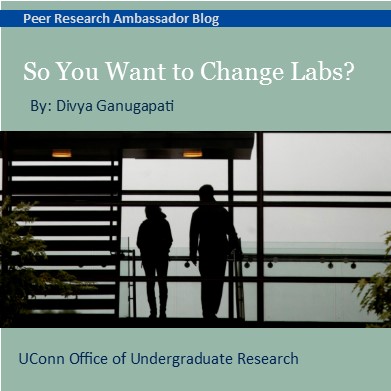By: Divya Ganugapati, OUR Peer Research Ambassador
“Every project is a race between your enthusiasm and your ability to get it done. Go fast. Don’t slow down. A year from now, new things will interest you” – Jill Soloway
One of the first things anyone told me on my first day at the Language and Brain (LAB) Laboratory was to make sure to not constrict the breadth of my research experience and involvement by staying in the same lab for four years. My immediate thought was “Why would anyone want to change?” After being a research assistant in the LAB Lab for close to three years, it has become more and more apparent as to how individuals change during the course of their research experience; at least I know I certainly have.
Being able to properly address when and why a change in research is needed is the most important step in catering to your individualistic curiosities, career plans, and interests. Once those questions are answered, being able to switch labs in a professional manner while maintaining your relationship with faculty mentors and researchers is vital.
Here are some “Do’s” and “Don’ts” when thinking about switching labs.
1. Do understand your goals
It is productive to recognize what skills and goals you hope to accomplish as a result of doing research. Having a strong understanding of these goals is important when switching labs as it can assist in 1) figuring out whether your current lab will help you reach those goals, and 2) if not, what other labs will provide you the resources to do so.
2. Do maintain a strong relationship with your mentor
Exiting a lab in a professional manner to ensure that any mentorships are not broken and lost, can seem quite difficult. However, having a professional, in-person conversation about your goals with your mentor, in which you explain how your time in their lab has positively impacted you and your reasons for switching labs, can be a good way to maintain a mentorship relationship with a researcher even when you are no longer in that lab. Also, writing thank you letters and having meetings every now-and-then are beneficial ways to show your gratitude and make yourself memorable.
Following these steps has allowed me to continue my relationship with Dr. Myers in the LAB Lab, and grow a new mentorship relationship with Dr. Theodore in the Spoken Language and Processing (SLaP) Lab (where my experiment was eventually designed and conducted). I now have two admirable and distinguished professionals as my research mentors.
3. Do switch labs if you are no longer interested in that field
Research is about exploring your curiosities, getting experience in the nitty-gritties of a specific topic, and complementing your education in a more hands-on way. As you take more classes, it becomes easier to fine-tune your interests; this might increase your passion for your field or could indicate that it might not be the field for you. Interests can vary immensely throughout four years, so it is not unusual that what interested you during freshman year could be different from what may attract you senior year. As a result, changing labs to adapt to your own developing passions could serve as a great step in the right direction.
4. Don’t switch labs because you think you must do research in a different field
As a pre-med student, I understand the misconception that doing research in a wet lab such as in biology or chemistry is what medical schools are looking for. In reality medical schools are more interested in students pursuing fields that they are passionate about. When taking courses such as BIOL 1107, I was more interested in the lecture aspect of the course rather than the labs. Rather than half-heartedly assisting in research I am not passionate about, I decided to look for opportunities related to neuro-anatomy and speech acquisition/recognition, which are fields that are of true interest to me. As a result, I joined the Language and Brain Laboratory under the supervision of Dr. Emily Myers, which addressed my interest in neuroscience as well as language.
5. Don’t switch labs because you are doing grunt work
The first day I started my research assistant position in the LAB Laboratory, in the spring semester of freshman year, I was given a stack of 84 vocabulary papers each with 27 words and definitions. My task was to transpose all the written definitions into an excel spreadsheet. That’s 2,268 definitions. I spent three weeks deciphering handwriting and copying the definitions into an Excel spreadsheet. While this was not ideally how I wanted to spend my time at research, it was encouraging me to understand the fundamentals of doing research. In the big scheme, researchers are conducting expansive and intricate projects, however in reality they hold a broad range of responsibilities starting from basic tasks such as transposing definitions from paper to Excel and stretching all the way to submitting papers to journals for publication. To be a confident and successful researcher, doing “grunt” work is an important step towards tackling more extensive tasks. Now, as a junior, I have grown so much from typing definitions; I have run a subject through an fMRI, thoroughly analyzed their brain scan using AFNI software, and even created tables and figures used in published papers.
Overview
Looking back at my experience within both the LAB Lab and SLaP Lab, I am thankful for each lab’s part in allowing me to accomplish my goals. By handling lab switching in a professional manner, I have maintained relationships with two remarkable mentors, Dr. Myers and Dr. Theodore, who have provided me with so much diverse and expansive knowledge that has elevated my experiences as not only a researcher, but as an undergraduate altogether.
Divya Ganugapati is a junior majoring in cognitive science and minoring in chemistry. Click here to learn more about Divya.